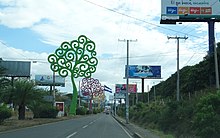The Trees of Life (Spanish: Árboles de la Vida) are a public art installation in Managua, Nicaragua. Begun in 2013 to honor the 34th anniversary of the Sandinista Revolution,[1] the Trees of Life are a city beautification project of First Lady Rosario Murillo, who has also served as Nicaragua's Vice President since 2017.


The approximately 140 abstract, brightly colored tree sculptures were reportedly inspired by the 1909 work by Austrian painter Gustav Klimt called The Tree of Life, Stoclet Frieze.[1] They are made of metal and decorated by 2.5 million tiny light bulbs in total.[2] Standing 42 to 56 feet tall, they cost a reported $20,000[3] to $25,000 (USD) apiece and in total $1 million to light annually.[4]
The Trees often line streets and parks in Managua and sometimes accompany other statues, including the illuminated statue of Hugo Chávez in Managua's Hugo Chávez Roundabout,[5] which cost $1.1 million to construct, and the statue of Nicaraguan revolutionary (and Murillo's great-uncle) Augusto Sandino on the stage of Managua's outdoor concert venue, the Acoustic Shell.[1]
Commentary on the visual style of the installation has been mixed. One observer compared them to the lavish Catholic cathedrals constructed in the colonial period, saying "these vibrant public artworks have drastically brightened the streets of Managua — and in a relatively short time."[1] However other viewers have called them "garish".[6][7]
In the 2018 protests, demonstrators toppled, and in some cases set on fire,[8] a number of the Trees, a gesture widely interpreted as a rebuke to the administration and Murillo specifically.[7][9][10]
References edit
- ^ a b c d Mallonee, Laura C. (2014-03-31). "Psychedelic Symbols of State Power in Nicaragua". Hyperallergic. Archived from the original on 2018-05-12. Retrieved 2018-05-11.
- ^ Rogers, Tim (December 8, 2015). "Nicaragua's capital city is batshit crazy, which is why I love it". Splinter. Archived from the original on 11 May 2018. Retrieved 10 May 2018.
- ^ Wilkinson, Tracy (May 24, 2015). "Nicaragua's first lady is a powerful partner of president". Los Angeles Times. Retrieved 10 May 2018.
- ^ "The violent end of Daniel Ortega's decade of quiet". The Economist. April 26, 2018. Archived from the original on 9 May 2018. Retrieved 10 May 2018.
- ^ Moncada, Roy (2016-07-28). "Rotonda Hugo Chávez es la "mimada" en Managua". La Prensa (in European Spanish). Archived from the original on 2018-05-12. Retrieved 2018-05-12.
- ^ Jarquín Chamorro, Mateo (2018-04-26). "Opinion | The Beginning of the End for Ortega?". The New York Times. ISSN 0362-4331. Archived from the original on 2018-05-12. Retrieved 2018-05-12.
- ^ a b Phillips, Tom (28 April 2018). "Nicaragua's toppling 'trees' strike ominous note for Daniel Ortega's rule". The Guardian. Archived from the original on 11 May 2018. Retrieved 11 May 2018.
- ^ Galeano, Luis Manuel (21 April 2018). "2 more killed in Nicaragua social security protests: reports". Washington Post. Retrieved 11 May 2018.
- ^ Diao, Alexis (April 22, 2018). "Nicaragua's President Withdraws Social Security Reforms That Sparked Violent Unrest". NPR.org. Archived from the original on 2018-04-22. Retrieved 2018-05-11.
- ^ Córdoba, José de (2018-04-22). "Nicaragua Protesters Clash With Police". Wall Street Journal. ISSN 0099-9660. Archived from the original on 2018-05-11. Retrieved 2018-05-11.